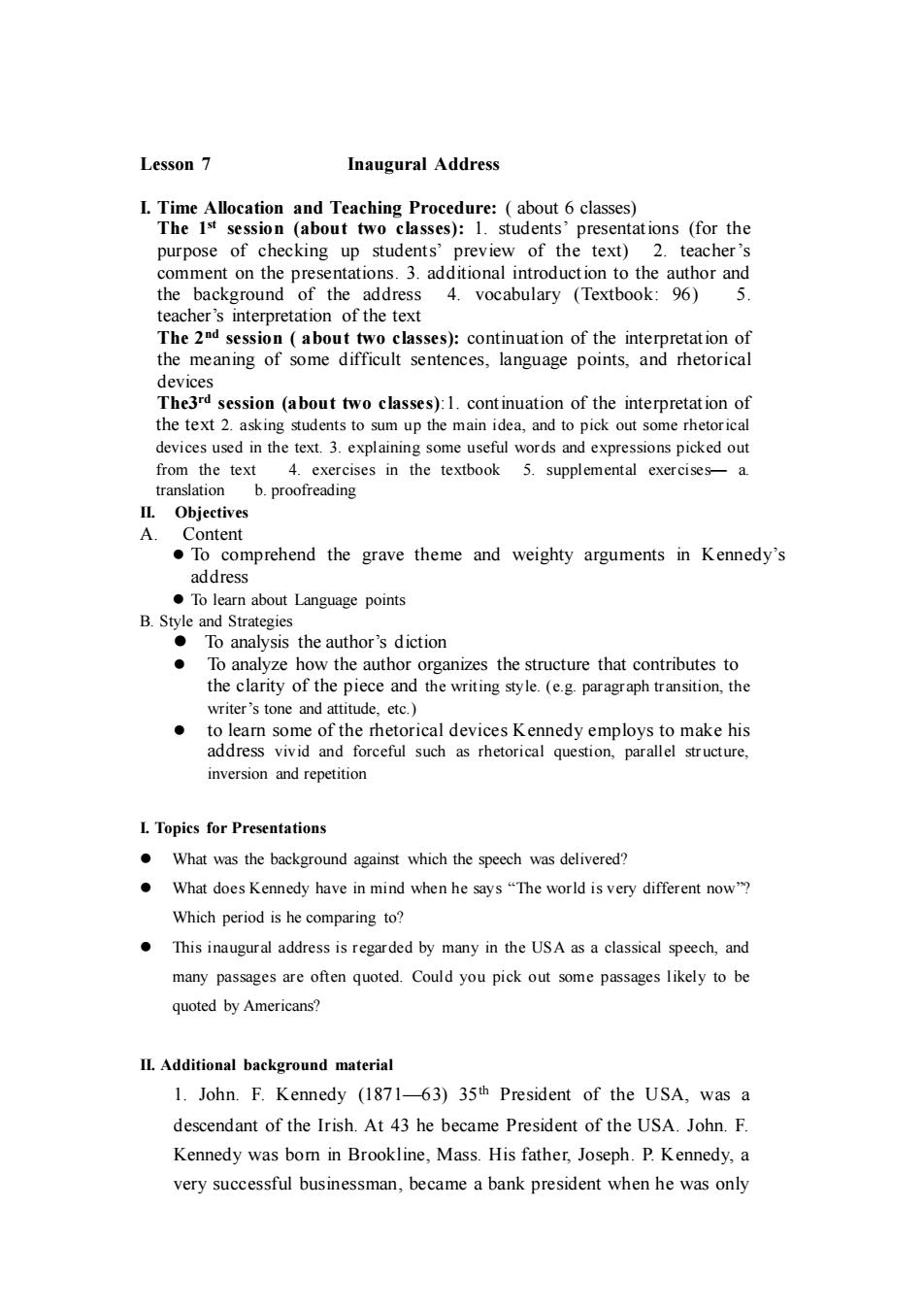
Lesson7 Inaugural Address on and Teaching Procedure:(about 6classes es): pre tions (for the purpose n唱 pre 3.3d9 prev text) che a or an Te pretation of the on ab the meaning of some difficult sente nces lan and rhetorical devices The3rd session (about two classes):1.continuation of the interpretation of the text 2.asking students to sum up the main idea,and to pick out some rhetorical devices used in the text.3.explaining some useful words and expressions picked out from the text 4.exercises in the textbook 5.supplemental exercisesa translation b proofreading IL.Objectives A.Content To comprehend the grave theme and weighty arguments in Kennedy's address To learn about language points le and Strategies To analysis the author's diction To analyze how the author organizes the structure that contributes to the clarity of the piece and the writing style.(e.g.paragraph transition,the writer's tone and attitude,etc.) to learn some of the rhetorical devices Kennedy employs to make his address vivid and forceful such as rhetorical question,parallel structure, inversion and repetition L.Topics for Presentations What was the background against which the speech was delivered? What does Kennedy have in mind when he savs "The world is very different now"? Which period is he comparing to? This inaugural address is regarded by many in the USA as a classical speech,and many passages are often quoted.Could you pick out some passages likely to be quoted by Americans? II.Additional background material 1.John.F.Kennedy (1871-63)35th President of the USA,was a descendant of the Irish.At 43 he became President of the USA.John.F. Kennedy was bom in Brookline,Mass.His father,Joseph.P.Kennedy,a very successful businessman,became a bank president when he was only
Lesson 7 Inaugural Address I. Time Allocation and Teaching Procedure: ( about 6 classes) The 1 st session (about two classes): 1. students’ presentations (for the purpose of checking up students’ preview of the text) 2. teacher’s comment on the presentations. 3. additional introduction to the author and the background of the address 4. vocabulary (Textbook: 96) 5. teacher’s interpretation of the text The 2nd session ( about two classes): continuation of the interpretation of the meaning of some difficult sentences, language points, and rhetorical devices The3rd session (about two classes):1. continuation of the interpretation of the text 2. asking students to sum up the main idea, and to pick out some rhetorical devices used in the text. 3. explaining some useful words and expressions picked out from the text 4. exercises in the textbook 5. supplemental exercises— a. translation b. proofreading II. Objectives A. Content ⚫ To comprehend the grave theme and weighty arguments in Kennedy’s address ⚫ To learn about Language points B. Style and Strategies ⚫ To analysis the author’s diction ⚫ To analyze how the author organizes the structure that contributes to the clarity of the piece and the writing style. (e.g. paragraph transition, the writer’s tone and attitude, etc.) ⚫ to learn some of the rhetorical devices Kennedy employs to make his address vivid and forceful such as rhetorical question, parallel structure, inversion and repetition I. Topics for Presentations ⚫ What was the background against which the speech was delivered? ⚫ What does Kennedy have in mind when he says “The world is very different now”? Which period is he comparing to? ⚫ This inaugural address is regarded by many in the USA as a classical speech, and many passages are often quoted. Could you pick out some passages likely to be quoted by Americans? II. Additional background material 1. John. F. Kennedy (1871—63) 35th President of the USA, was a descendant of the Irish. At 43 he became President of the USA. John. F. Kennedy was born in Brookline, Mass. His father, Joseph. P. Kennedy, a very successful businessman, became a bank president when he was only
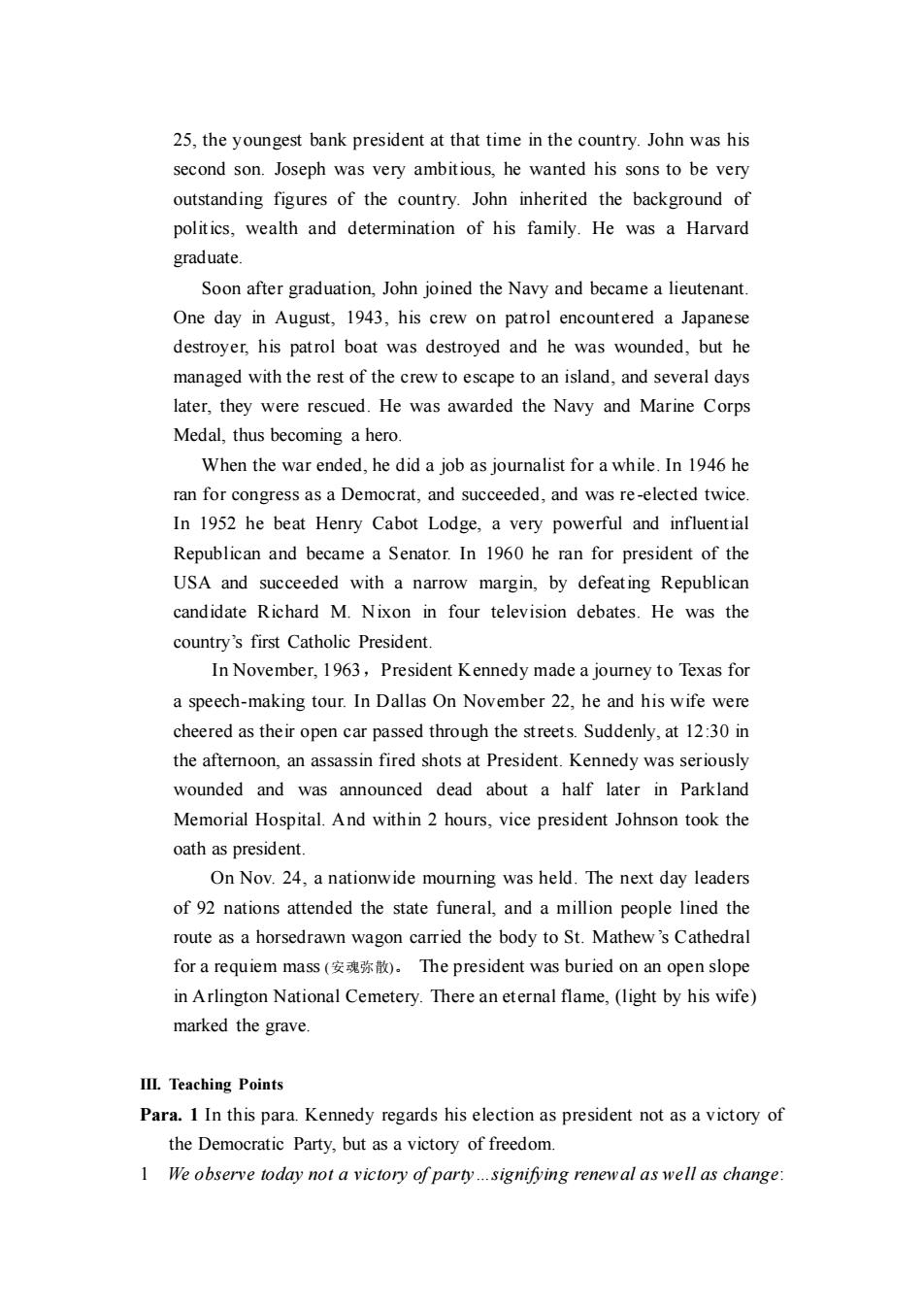
25,the youngest bank president at that time in the country.John was his second son.Joseph was very ambitious,he wanted his sons to be very outstanding figures of the country.John inherited the background of politics,wealth and determination of his family.He was a Harvard graduate. Soon after graduation,John joined the Navy and became a lieutenant. One day in August,1943.his crew on patrol encountered a Japanese destroyer,his patrol boat was destroyed and he was wounded,but he managed with the rest of the crew to escape to an island,and several days later,they were rescued.He was awarded the Navy and Marine Corps Medal,thus becoming a hero. When the war ended,he did a job as journalist for a while.In 1946 he ran for congress as a Democrat,and succeeded,and was re-elected twice In 1952 he beat Henry Cabot Lodge,a very powerful and influential Republican and became a Senator.In 1960 he ran for president of the USA and succeeded with a narrow margin,by defeating Republican candidate Richard M.Nixon in four television debates.He was the country's first Catholic President. In November.1963,President Kennedy made a journey to Texas for a speech-making tour.In Dallas On November 22.he and his wife were cheered as their open car passed through the streets.Suddenly,at 12:30 in the afternoon,an assassin fired shots at President.Kennedy was seriously wounded and was announced dead about a half later in Parkland Memorial Hospital.And within 2 hours,vice president Johnson took the oath as president. On Nov.24,a nationwide mourning was held.The next day leaders of 92 nations attended the state funeral,and a million people lined the route as a horsedrawn wagon carried the body to St.Mathew's Cathedral for a requiem mass(安魂弥散)。The president was buried on an open slope in Arlington National Cemetery.There an eternal flame,(light by his wife) marked the grave I.Teaching Points Para.1 In this para.Kennedy regards his election as president not as a victory of the Democratic Party,but as a victory of freedom. 1 We observe today not a victory of party.signifying renewal as well as change
25, the youngest bank president at that time in the country. John was his second son. Joseph was very ambitious, he wanted his sons to be very outstanding figures of the country. John inherited the background of politics, wealth and determination of his family. He was a Harvard graduate. Soon after graduation, John joined the Navy and became a lieutenant. One day in August, 1943, his crew on patrol encountered a Japanese destroyer, his patrol boat was destroyed and he was wounded, but he managed with the rest of the crew to escape to an island, and several days later, they were rescued. He was awarded the Navy and Marine Corps Medal, thus becoming a hero. When the war ended, he did a job as journalist for a while. In 1946 he ran for congress as a Democrat, and succeeded, and was re -elected twice. In 1952 he beat Henry Cabot Lodge, a very powerful and influential Republican and became a Senator. In 1960 he ran for president of the USA and succeeded with a narrow margin, by defeating Republican candidate Richard M. Nixon in four television debates. He was the country’s first Catholic President. In November, 1963,President Kennedy made a journey to Texas for a speech-making tour. In Dallas On November 22, he and his wife were cheered as their open car passed through the streets. Suddenly, at 12:30 in the afternoon, an assassin fired shots at President. Kennedy was seriously wounded and was announced dead about a half later in Parkland Memorial Hospital. And within 2 hours, vice president Johnson took the oath as president. On Nov. 24, a nationwide mourning was held. The next day leaders of 92 nations attended the state funeral, and a million people lined the route as a horsedrawn wagon carried the body to St. Mathew ’s Cathedral for a requiem mass (安魂弥散)。 The president was buried on an open slope in Arlington National Cemetery. There an eternal flame, (light by his wife) marked the grave. III. Teaching Points Para. 1 In this para. Kennedy regards his election as president not as a victory of the Democratic Party, but as a victory of freedom. 1 We observe today not a victory of party.signifying renewal as well as change:
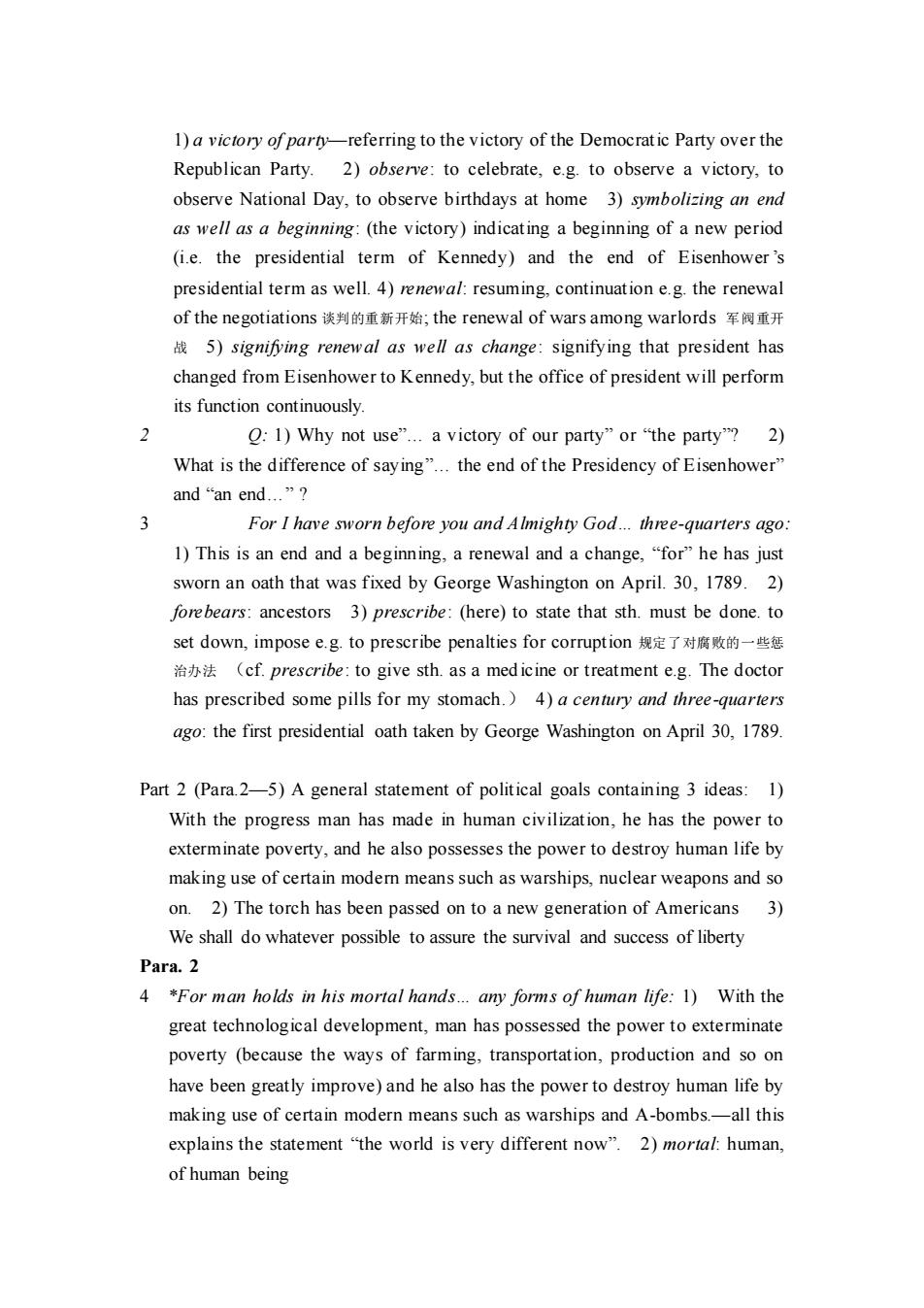
1)a victory ofpart-referring to the victory of the Democratic Party over the Republican Party. 2)observe:to celebrate,e.g.to observe a victory,to observe National Day,to observe birthdays at home 3)symbolizing an end as well as a beginning:(the victory)indicating a beginning of a new period (i.e.the presidential term of Kennedy)and the end of Eisenhower's presidential term as well.4)renewal:resuming,continuation e.g.the renewal of the negotiations谈判的重新开始;the renewal of wars among warlords军阀重开 5)signifying renewal as well as change:signifying that president has changed from Eisenhower to Kennedy,but the office of president will perform its function continuously. O:1)Why not use".a victory of our party"or"the party"?2) What is the difference of saving".the end of the Presidency of Eisenhower and“an end.n? For I have sworn before you and Almighty God.three-quarters ago: 1)This is an end and a beginning,a renewal and a change,"for"he has just sworn an oath that was fixed by George Washington on April.30,1789.2) forebears:ancestors 3)prescribe:(here)to state that sth.must be done.to set down,impose e.g.to prescribe penalties for corruption规定了对腐败的一些惩 (cf.prescribe:to give sth.as a medicine or treatment e.g.The doctor has prescribed some pills for my stomach.)4)a century and three-quarters ago:the first presidential oath taken by George Washington on April 30.1789. Part 2 (Para.2-5)A general statement of political goals containing 3 ideas:1) With the progress man has made in human civilization,he has the power to exterminate poverty,and he also possesses the power to destroy human life by making use of certain modern means such as warships,nuclear weapons and so on.2)The torch has been passed on to a new generation of Americans 3) We shall do whatever possible to assure the survival and success of liberty Para.2 4 *For man holds in his mortal hands.any forms of human life:1)With the great technological development,man has possessed the power to exterminate poverty (because the ways of farming,transportation,production and so on have been greatly improve)and he also has the power to destroy human life by making use of certain modern means such as warships and A-bombs.-all this explains the statement "the world is very different now".2)mortal:human, of human being
1) a victory of party—referring to the victory of the Democratic Party over the Republican Party. 2) observe: to celebrate, e.g. to observe a victory, to observe National Day, to observe birthdays at home 3) symbolizing an end as well as a beginning: (the victory) indicating a beginning of a new period (i.e. the presidential term of Kennedy) and the end of Eisenhower ’s presidential term as well. 4) renewal: resuming, continuation e.g. the renewal of the negotiations 谈判的重新开始; the renewal of wars among warlords 军阀重开 战 5) signifying renewal as well as change: signifying that president has changed from Eisenhower to Kennedy, but the office of president will perform its function continuously. 2 Q: 1) Why not use”. a victory of our party” or “the party”? 2) What is the difference of saying”. the end of the Presidency of Eisenhower” and “an end.” ? 3 For I have sworn before you and Almighty God. three-quarters ago: 1) This is an end and a beginning, a renewal and a change, “for” he has just sworn an oath that was fixed by George Washington on April. 30, 1789. 2) forebears: ancestors 3) prescribe: (here) to state that sth. must be done. to set down, impose e.g. to prescribe penalties for corruption 规定了对腐败的一些惩 治办法 (cf. prescribe: to give sth. as a medicine or treatment e.g. The doctor has prescribed some pills for my stomach.) 4) a century and three-quarters ago: the first presidential oath taken by George Washington on April 30, 1789. Part 2 (Para.2—5) A general statement of political goals containing 3 ideas: 1) With the progress man has made in human civilization, he has the power to exterminate poverty, and he also possesses the power to destroy human life by making use of certain modern means such as warships, nuclear weapons and so on. 2) The torch has been passed on to a new generation of Americans 3) We shall do whatever possible to assure the survival and success of liberty Para. 2 4 *For man holds in his mortal hands. any forms of human life: 1) With the great technological development, man has possessed the power to exterminate poverty (because the ways of farming, transportation, production and so on have been greatly improve) and he also has the power to destroy human life by making use of certain modern means such as warships and A-bombs.—all this explains the statement “the world is very different now”. 2) mortal: human, of human being
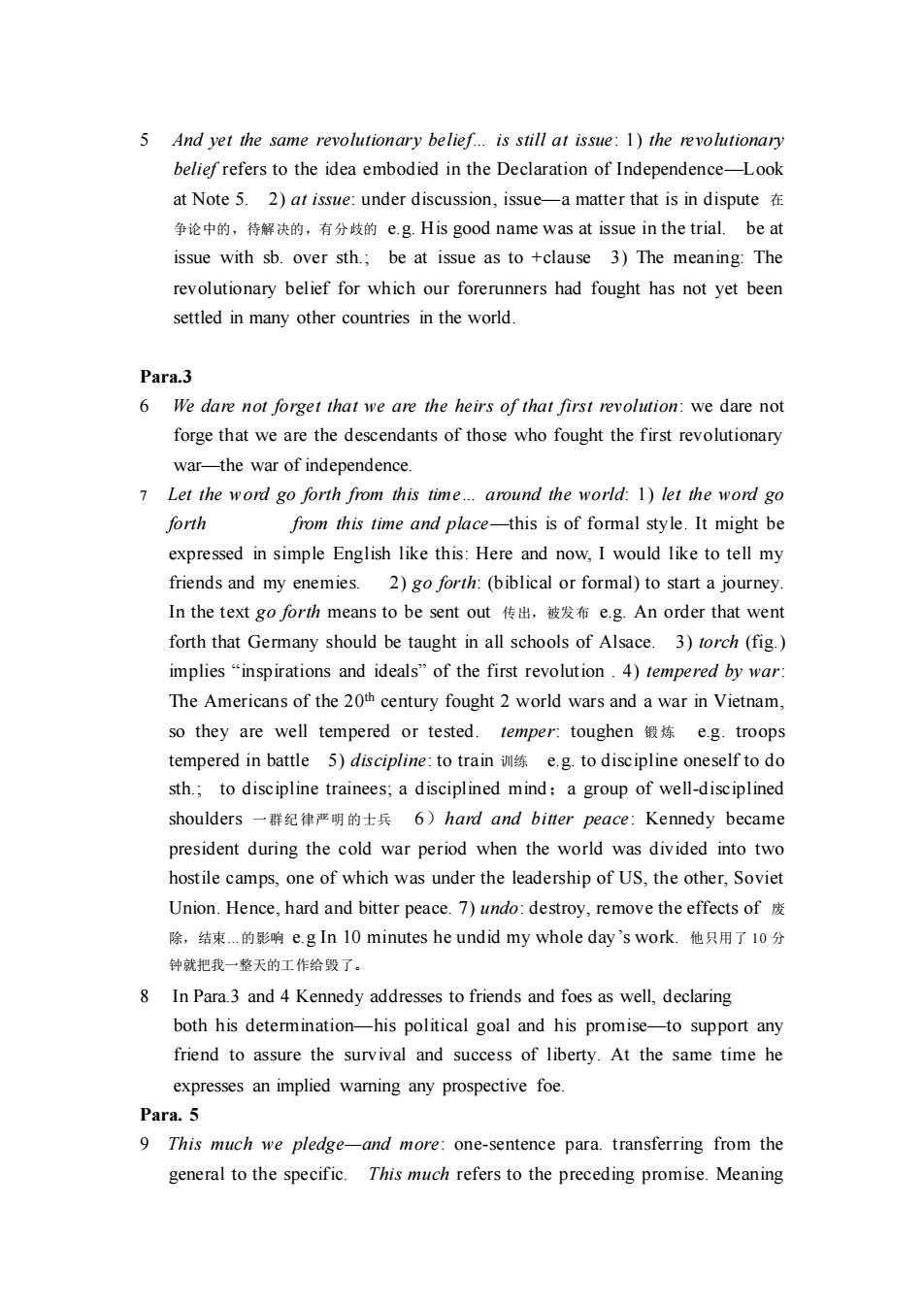
5 And yet the same revolutionary belief.is still at issue:1)the revolutionary belief refers to the idea embodied in the Declaration of Independence-Look at Note 5.2)at issue:under discussion,issue-a matter that is in dispute 争论中的,特解决的,有分歧的e.g.His good name was at issue in the trial.beat issue with sb.over sth.;be at issue as to +clause 3)The meaning:The revolutionary belief for which our forerunners had fought has not yet been settled in many other countries in the world. Para.3 6 We dare not forget that we are the heirs of that first revolution:we dare not forge that we are the descendants of those who fought the first revolutionary war-the war of independence. 7 Let the word go forth from this time.around the world:1)let the word go forth from this time and place-this is of formal style.It might be expressed in simple English like this:Here and now,I would like to tell my friends and my enemies.2)goforth:(biblical or formal)to start a journey In the text go forth means to be sent out传出,被发布e.g.An order that went forth that Germany should be taught in all schools of Alsace.3)torch(fig.) implies"inspirations and ideals"of the first revolution.4)tempered by war The Americans of the 20th century fought 2 world wars and a war in Vietnam. so they are well tempered or tested.temper:toughen e.g.troops tempered in battle 5)discipline:to train e.g.to discipline oneself to do sth.:to discipline trainees;a disciplined mind:a group of well-disciplined shoulders一群纪律严明的士兵6)hard and bitter peace:Kennedy became president during the cold war period when the world was divided into two hostile camps,one of which was under the leadership of US,the other,Soviet Union.Hence,hard and bitter peace.7)undo:destroy,remove the effects of 除,结束.的影e.gInl0 minutes he undid my whole day's work.他只用了io分 钟就把我一整天的工作给毁了· 8 In Para3 and 4 Kennedy addresses to friends and foes as well,declaring both his determination-his political goal and his promise-to support any friend to assure the survival and success of liberty.At the same time he expresses an implied warning any prospective foe. Para.5 9 This much we pledge-and more:one-sentence para.transferring from the general to the specific.This much refers to the preceding promise.Meaning
5 And yet the same revolutionary belief. is still at issue: 1) the revolutionary belief refers to the idea embodied in the Declaration of Independence—Look at Note 5. 2) at issue: under discussion, issue—a matter that is in dispute 在 争论中的,待解决的,有分歧的 e.g. His good name was at issue in the trial. be at issue with sb. over sth.; be at issue as to +clause 3) The meaning: The revolutionary belief for which our forerunners had fought has not yet been settled in many other countries in the world. Para.3 6 We dare not forget that we are the heirs of that first revolution: we dare not forge that we are the descendants of those who fought the first revolutionary war—the war of independence. 7 Let the word go forth from this time. around the world: 1) let the word go forth from this time and place—this is of formal style. It might be expressed in simple English like this: Here and now, I would like to tell my friends and my enemies. 2) go forth: (biblical or formal) to start a journey. In the text go forth means to be sent out 传出,被发布 e.g. An order that went forth that Germany should be taught in all schools of Alsace. 3) torch (fig.) implies “inspirations and ideals” of the first revolution . 4) tempered by war: The Americans of the 20th century fought 2 world wars and a war in Vietnam, so they are well tempered or tested. temper: toughen 锻 炼 e.g. troops tempered in battle 5) discipline: to train 训练 e.g. to discipline oneself to do sth.; to discipline trainees; a disciplined mind;a group of well-disciplined shoulders 一 群纪 律严明 的士兵 6)hard and bitter peace: Kennedy became president during the cold war period when the world was divided into two hostile camps, one of which was under the leadership of US, the other, Soviet Union. Hence, hard and bitter peace. 7) undo: destroy, remove the effects of 废 除,结束.的影响 e.g In 10 minutes he undid my whole day’s work. 他只用了 10 分 钟就把我一整天的工作给毁了。 8 In Para.3 and 4 Kennedy addresses to friends and foes as well, declaring both his determination—his political goal and his promise—to support any friend to assure the survival and success of liberty. At the same time he expresses an implied warning any prospective foe. Para. 5 9 This much we pledge—and more: one-sentence para. transferring from the general to the specific. This much refers to the preceding promise. Meaning
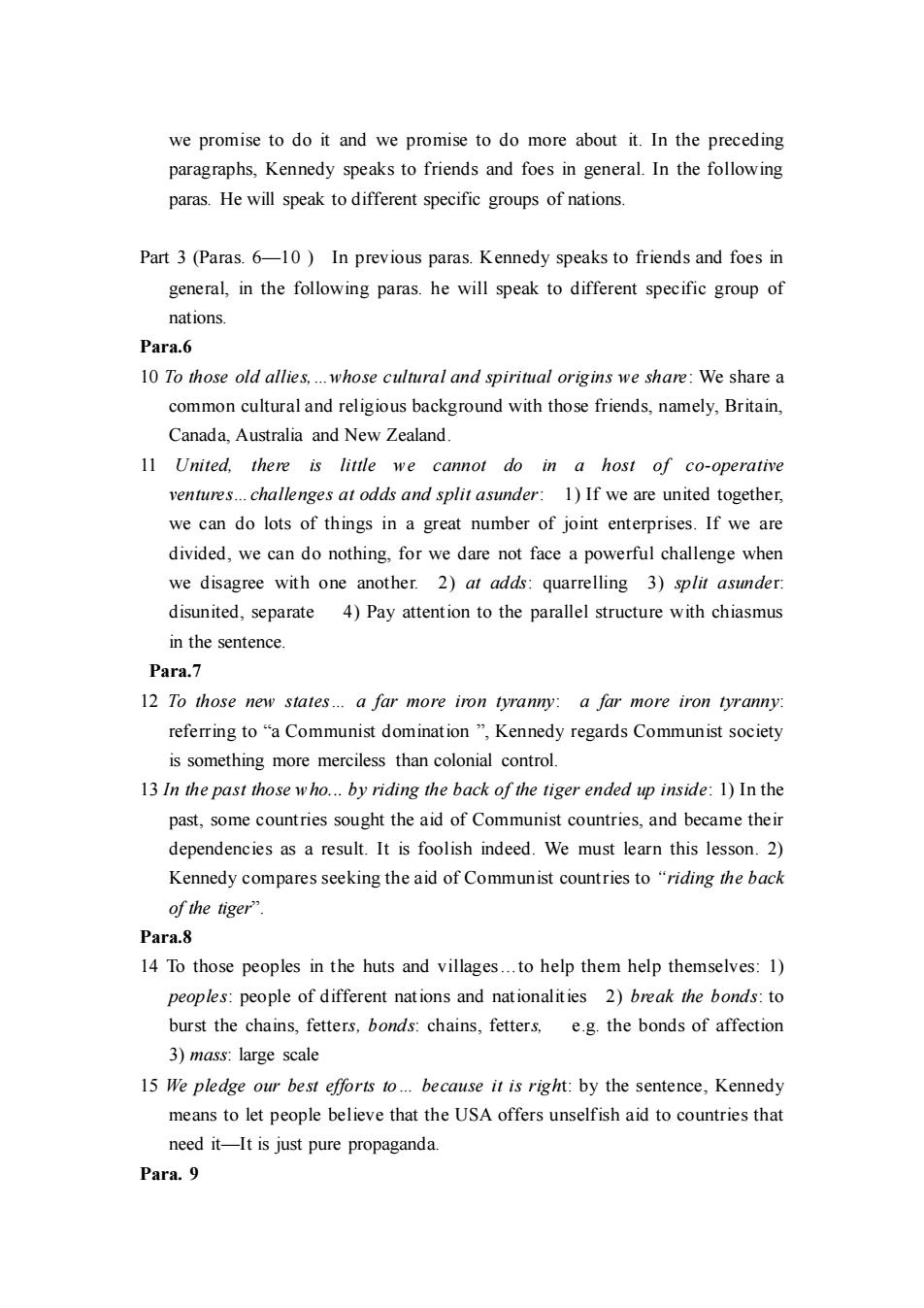
we promise to do it and we promise to do more about it.In the preceding paragraphs,Kennedy speaks to friends and foes in general.In the following paras.He will speak to different specific groups of nations. Part 3(Paras.6-10)In previous paras.Kennedy speaks to friends and foes in general,in the following paras.he will speak to different specific group of nations. Para.6 10 To those old allies.whose cultural and spiritual origins we share:We share a common cultural and religious background with those friends,namely.Britain, Canada,Australia and New Zealand. 11 United.there is little we cannot do in a host of co-operative ventures.challenges at odds and split asunder:1)If we are united together. we can do lots of things in a great number of joint enterprises.If we are divided,we can do nothing,for we dare not face a powerful challenge when we disagree with one another.2)at adds:quarrelling 3)split asunder. disunited,separate 4)Pay attention to the parallel structure with chiasmus in the sentence Para.7 12 To those new states.a far more iron tyranny: a far more iron tvranny referring to"a Communist domination".Kennedy regards Communist society is something more merciless than colonial control. 13 In the past those who.by riding the back of the tiger ended up inside:1)In the past,some countries sought the aid of Communist countries,and became their dependencies as a result.It is foolish indeed.We must learn this lesson.2) Kennedy compares seeking the aid of Communist countries to "riding the back of the tiger" Para.8 14 To those peoples in the huts and villages.to help them help themselves:1) peoples:people of different nations and nationalities 2)break the bonds:to burst the chains,fetters,bonds:chains,fetters, e.g.the bonds of affection 3)mass:large scale 15 We pledge our best efforts to.because it is right:by the sentence,Kennedy means to let people believe that the USA offers unselfish aid to countries that need it-It is just pure propaganda. Para.9
we promise to do it and we promise to do more about it. In the preceding paragraphs, Kennedy speaks to friends and foes in general. In the following paras. He will speak to different specific groups of nations. Part 3 (Paras. 6—10 ) In previous paras. Kennedy speaks to friends and foes in general, in the following paras. he will speak to different specific group of nations. Para.6 10 To those old allies,.whose cultural and spiritual origins we share: We share a common cultural and religious background with those friends, namely, Britain, Canada, Australia and New Zealand. 11 United, there is little we cannot do in a host of co-operative ventures.challenges at odds and split asunder: 1) If we are united together, we can do lots of things in a great number of joint enterprises. If we are divided, we can do nothing, for we dare not face a powerful challenge when we disagree with one another. 2) at adds: quarrelling 3) split asunder: disunited, separate 4) Pay attention to the parallel structure with chiasmus in the sentence. Para.7 12 To those new states. a far more iron tyranny: a far more iron tyranny: referring to “a Communist domination ”, Kennedy regards Communist society is something more merciless than colonial control. 13 In the past those who. by riding the back of the tiger ended up inside: 1) In the past, some countries sought the aid of Communist countries, and became their dependencies as a result. It is foolish indeed. We must learn this lesson. 2) Kennedy compares seeking the aid of Communist countries to “riding the back of the tiger”. Para.8 14 To those peoples in the huts and villages.to help them help themselves: 1) peoples: people of different nations and nationalities 2) break the bonds: to burst the chains, fetters, bonds: chains, fetters, e.g. the bonds of affection 3) mass: large scale 15 We pledge our best efforts to. because it is right: by the sentence, Kennedy means to let people believe that the USA offers unselfish aid to countries that need it—It is just pure propaganda. Para. 9